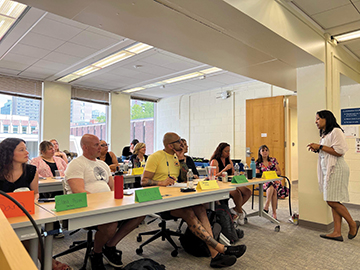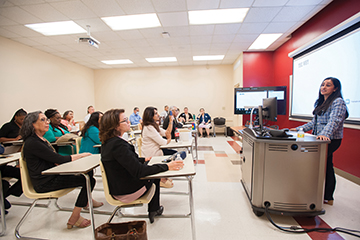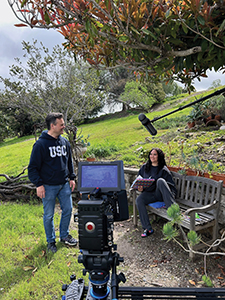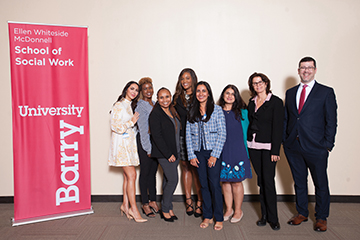DSW 2.0: Revamped Advanced Social Work Degree Gains Traction
Since Oasis of Hope Hospital in Tijuana, Mexico, engages in a lot of social outreach programs, CEO Daniel E. Kennedy decided to expand his management skills by pursuing a doctor in social work (DSW) degree at USC’s Suzanne Dworak-Peck School of Social Work — and is glad he did.
Among other things, he says, “classes like Executive Leadership and Community Public Communication have let me bring so much knowledge back to my current job and make improvements in the way we do things.”

The DSW degree has recently gained traction in social work academia. Decades ago, the social work doctoral degree at many universities was the DSW degree, but, for enhanced status and recognition, it ultimately morphed into the PhD degree, says Dr. Jacqueline Corcoran, LCSW, DSW, director at the University of Pennsylvania’s School of Social Policy and Practice.
Pictured: Dr. Tamara J. Cadet, LICSW, MPH, welcomes Penn DSW students to an on-campus immersion session in August 2022, attended by DSW Director Dr. Jacqueline Corcoran (far right)
Then in 2007, Penn dusted off the original name and created a “new doctoral degree that was more clinically focused and for advanced practitioners in the field,” says Corcoran.
Differences in Focus
Today, the usual DSW degree model remains advanced clinical but there’s plenty of variation, a lot of it around leadership and educator training. DSW student Gwendolyne Tuttle, LCSW, clinical coordinator at the Cornerstones of Maine transitional-living center, came to Penn for its strong emphasis on psychoanalysis — “pretty rare in social work,” she says — and research.
Simmons University’s more recent DSW program is particularly heavy on social justice, says Program Director Dr. Jacqueline T. Dyer. “I made sure it was infused in every single clinical and administrative course we have to create a unique and comprehensive experience.”

For the four-year-old DSW program at Barry University in Florida, the main focus is on advanced trauma-informed leadership and practice, according to Dr. Mitchell Rosenwald, professor and director of doctoral studies. Students take clinical, administrative and community-focused courses related to trauma, whether individual or historically shared (as in racism or poverty).
Pictured: Barry University DSW students and social work professors at the inaugural Capstone Showcase Doctoral Symposium in August 2022
And while most DSW programs mandate that applicants have an MSW, USC’s is interdisciplinary, with its students simply needing a master’s, says Dr. Jennifer Lewis, associate professor and director of the MSW and DSW programs.
“We value the different perspectives on some of these big, deep-seated, systemic problems such as racism that we don’t believe social workers can solve in isolation.”
.jpg?ver=iv0Q76GtW1FaH7MCyMt0TQ%3d%3d)
That structure could change in a few years, as the Council on Social Work Education (CSWE) is pilot-testing DSW degree accreditation that will surely require students to have an MSW. One possibility USC is considering, says Lewis, is having the DSW degree for social work students and a related certificate for other disciplines.
Pictured: USC professor Jane James, MSW (bottom row, far right), facilitates a DSW Zoom class in March
A chief reason for the resurgence of the DSW degree has been to match the introduction of practice doctorates in other health professions such as occupational therapy and physical therapy, not only to “have a seat at the table” in health care settings such as decision making and treatment planning, say Rosenwald and Corcoran, but also in competing for high-level jobs.
Capstone or Dissertation
One element that DSW programs share is a culminating project, whether it’s called a “capstone” or, in the case of the more research-oriented DSW programs, a dissertation. For example, at Simmons, one recent DSW grad’s capstone project involved designing an MSW course to help students understand “smart decarceration” (see “Simmons University” below).

At USC, Kennedy is making a series of films to test different ways of informing Hispanic parents about how best to engage with their teenage daughters on the risk of suicide.
Pictured: As part of his capstone project, USC DSW student Daniel E. Kennedy films three-time suicide survivor Alissa for his documentary “Heal the Disconnect."
At Barry University, recent grad Dr. Maria Silva’s capstone project was “Trauma-Informed Self-Care in Hospital Settings: A Post-COVID Necessity.”
And at Penn, Tuttle will be working on a dissertation called “Understanding the Experience of BIPOC Patients with Borderline Personality Disorder in Mentalization Based Treatment with a White Therapist: A Pilot Study.”
In her studies so far, Tuttle says she has particularly benefited from learning “how to effectively and carefully evaluate existing research so I can enhance my own practice and that of my supervisorees.”

And overall in social work, she adds, “a doctoral degree is really superior to a master’s-level degree if you’re looking to pursue a career in a leadership position as a clinical director or executive director.”
The DSW degree represents a growth industry within social work academia, with program introduction only likely to pick up speed when CSWE offers accreditation in a few years. There are currently just under 30 DSW programs, but Barry University’s Rosenwald predicts a tremendous expansion of program options in the decades to come: “They’ll be popping up like popcorn in your microwave.” Pictured at left: Members of the Class of 2022: Barry University’s first DSW degree grads.